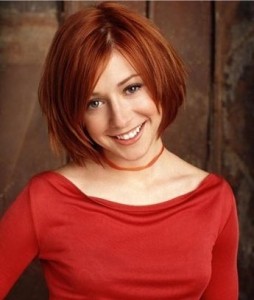 Editor’s note: Want to contribute a guest blog post? Contact us.
Editor’s note: Want to contribute a guest blog post? Contact us.
By Samuel Scott
In “Buffy the Vampire Slayer,” the character arc of Willow is that which changes the most. However, in contrast to most commentaries on the development of her character, the primary issue might not be her extrovert or introvert personality (depending on the season) or her transition into a lesbian. Her relationship with Judaism also needs to be addressed.
When we first meet Willow in the first episode of Season 1 after a short conversation with Xander in which he gets her to tutor him in math, Cordelia sees her at a Sunnydale High School water-fountain and comments on her manner of dress. Willow meekly remarks that her mother chose the outfit, and Cordelia responds, in a manner that is as witty as it is insulting, that it is nice that Willow has “seen the softer side of Sears” (in the context of an advertising tagline at the time):
What we see is the personality and style of Willow in what can be deemed “B.B.” — “Before Buffy.” And that context can be viewed as somewhat religiously Jewish. In religious Judaism, girls and women are expected to dress in a manner that is termed in Hebrew “tzniut (modest).” The specific laws are complex, but they can summarized by the following characteristics:
- The body from the collarbone to the elbows and to the knees must be covered by loose-fitting clothes
- As a result, the only skin that can be shown at the maximum is from the collarbone to the top of the head, from the elbows to the fingertips, and from the knees to the feet
- Skirts (knee-length, at least) are mandated over pants and shorts because they are loose-fitting
- Married women must cover their hair as well
For a real-world example, one can see this store that sells clothing to religious, Jewish women. Based on what we see early in Season 1, Willow’s dress certainly matches this description. Moreover, Willow’s behavior and personality “B. B.” is undoubtedly influenced by her family and their Judaism. Willow tells Buffy that she must go to Xander’s house each year to watch “A Charlie Brown Christmas Special.” When Xander mentions the “Christmas spirit,” Willow says, “Hanukah spirit — not everyone worships Santa.” When Buffy and Willow use a spell to prevent the evil Angel from entering the latter’s house, Willow remarks that her father would not like his daughter nailing crucifixes to her bedroom wall.
So, as we see, Willow — whether on her own, solely as a result of parental influence, or some combination of the two — is initially religiously Jewish to some degree as evidenced by her dress and behavior early in “Buffy the Vampire Slayer.” But the initial question is: How much? Most likely, Willow and her family is not Orthodox. Although her dress and the fact that she does not date in the beginning of the series is quite Orthodox, the fact that she attends a private school is atypical for Orthodox Jewish families (who almost always send their children to private, Orthodox Jewish schools). In addition, she eats the same food as everyone else at school and elsewhere — meaning that she does not keep kosher. Moreover, her mother, the one time we see her, does not dress modestly or wear a hair covering (as a married, Orthodox woman would). The fact that the Rosenbergs only had one child would also be atypical.
However, Willow seems to be religious enough in the beginning of the series in a way that is likely not Reform. Reform Jews, to varying degrees, are more accepting of Jewish celebrations of Christmas (as, in their view, a secular, national holiday rather than a purely-Christian one), even to the extent of putting up Christmas trees deemed to be “Hanuka bushes.” Moreover, no Reform Jew would dress as modestly as Willow did in the first episode of “Buffy.” So, after eliminating the two extremes of Jewish practice — Reform on the left and Orthodox on the right — we are left to say that Willow was, at first, a Conservative Jew.
As we know, Willow eventually begins practicing witchcraft towards the end of Season 2 and becomes steadily more-adept and stronger as the series progresses — to the point of almost destroying the world in Season 6 (see the picture below) and then changing the nature of the Slayer Line in Season 7’s finale of the show.
But the question remains: How did, or did not, Willow change as a Jewish woman?
First, it needs to be said that Willow remains a Jewish woman. Judaism itself defines a Jew as someone who is born to a Jewish mother or who converts to the religion — and once a person is a Jew through either of these two means, it cannot ever be voided. (Reform Judaism also includes people born to a Jewish father who were raised as Jews, but that is an issue for another time and place. The issue of what constitutes a “proper conversion” is also controversial and not relevant to our discussion here.) A Jew who decides to follow another religion is, in Jewish terms, still a Jew, but an apostate Jew.
Still, it seems that Willow never did officially convert to another religion. Here a distinction needs to be made between “witchcraft” and “Wicca,” even though “Buffy” uses the terms interchangeably. “Witchcraft,” in modern, so-called “neo-pagan” terms, is a practice of magic that involves the invocation of various deities merely as tools to achieve a purposes without worshiping them. “Wicca,” in the same terms, is a religion and theology that does worship a god and goddess and may or may not involve the practice of magic. In every instance throughout “Buffy the Vampire Slayer,” Willow does the former but not the latter. What Willow does is a practice rather than a religion — she only casts spells; she does not worship any deities.
As a result, we can say that Willow never formally turns her back on her Judaism by joining another religion (regardless of the fact that, at least according to traditional Jewish thought, a Jew is always a Jew, no matter what). However, a more-interesting question is what status a person who engages in her lesbian, magical practices would have within Judaism.
First, lesbianism is not forbidden in Orthodox (or other religious) Judaism. The prohibitions in the Torah (the first five books of the Hebrew Bible that comprise the Written Law in Judaism) states the following in the general, English translations:
- “Do not lie with a male as one lies with a woman; it is an abhorrence” (Leviticus 18:22, JPS translation)
- “If a man lies with a male as one lies with a woman, the two of them have done an abhorrent thing; they shall be put to death — their bloodguilt is upon them” (Leviticus 20:13, JPS translation)
The verses (emphasis added) state literally that only male-male sexual intercourse is forbidden; the Torah says nothing about female-female sexual acts. In Orthodox Judaism, lesbianism is not assur (“forbidden” in Hebrew) — it is only frowned upon since the ideal goal is for men and women to marry, have children, and raise families. (Non-Orthodox variants of Judaism, of course, have more permissive views.) In fact, it is reported that even some Orthodox Jewish girls in religious schools named seminaries experiment with lesbianism, perhaps because they cannot date and become sexually involved with boys until they are married, or at least engaged. (See a controversial, Israeli-French film that explored this topic.) Regardless, we can state that Willow’s realization of her lesbian feelings barely — or in no way — affects her “status” or “behavior” in terms of Judaism.
However, Willow’s practice of witchcraft is more complicated in the context of Judaism. The Torah states the following:
- “You shall not tolerate a sorceress” (Exodus 22:17, JPS translation)
- “Let no one be found upon you… who is an augur, a soothsayer, a diviner, a sorcerer, one who casts spells, or one who consults ghosts or familiar spirits, or who inquires of the dead. For anyone who does such things is abhorrent to the Lord…” (Deuteronomy 18:10-12, JPS translation)
Still, the ideal law was not always followed in practice. The Talmud — the so-called Oral Law that is the equal of the Written law of the Talmud — tells of many rabbis performing acts that could be viewed as magical. (See an interesting academic essay on witchcraft in early Judaism that argues, among other points, that there may have been a gender and class bias in this distinction — common, poor women were viewed as witches while male, prominent rabbis were seen as acting on behalf of God.) After all, the Hebrew Bible is full of stories of the Israeli people backsliding and worshiping other gods, among other related practices.
Moreover, the Talmud is also full of rabbis who warn the Jewish people against the supposed fallacies of witchcraft, astrology, and charms, but these exhortations reflect the fact that the need for such warnings existed — in other words, that a belief in such things, and the practice of them, persisted among Jews untold centuries ago just as they did among other peoples. So, we can state that the practice of behaviors like those done by Willow in “Buffy the Vampire Slayer” have always, to some degree, been practiced by some number of Jews, for better or worse (in rabbinical, Orthodox, Jewish opinion).
But what becomes more interesting is Willow’s evolution in Season 7, after she tries to destroy the world magically at the end of the prior season after the shooting death of her girlfriend, Tara. While Willow is rehabilitating in England with Giles, she realizes that “everything is connected.” Such a statement could be viewed as pantheistic — and decided not traditionally Jewish — but it could be interpreted in the context of Kabbalah, the mystical side of Judaism based largely on the Book of the Zohar (and which is not what Madonna and others purport to follow). Kabbalah views God through a series of interconnected emanations from the unknowable Keter to Malkut, which is the physical world itself. This is depicted in the Tree of Life:
In such a context, Willow could be recognizing that all of her power — and all of the world itself — is collectively the final emanation from the source (God) itself. Later, when Willow reaches the height of her power in the series finale while imbuing all potential slayers with the power of the actual slayer, she calls out “Oh… My… Goddess!”
While the mention of “Goddess” is most likely a pop-culture reference to the god and goddess that the aforementioned Wiccan religion worships, since Willow never actively joins that religion — as I have previously argued — I argue as well that it is a realization of the feminism aspect of God in the Kabbalah tradition of Judaism. In this construct, the initial construct of God (Keter) is genderless. However, the next two emanations — Hokmah and Binah, respectively — are male and female. It is the union of those two emanations that gives “birth” to the rest of God and the physical world itself. (This is a mystical reason why Judaism reveres and encourages the marriage of men and women — the unity reflects the nature of God.)
In fact, the recognition of the dual aspect of God is what may have allowed Willow to reach her powerful level in Season 7. In an overly-simplistic synopsis, Willow in Seasons 4 and 5 may be viewed as “feminine” and “loving” (one partial aspect of the Tree of Life in Kabbalah). In Season 6, she focused on the “male” and “judgmental” aspect. In Season 7, she was able to incorporate both parts into a healthy, complete whole (while saving and transforming the world at the same time).
—
How Jewish is Willow Rosenberg?
From all of these analyses, we can conclude the following:
- Willow began “Buffy the Vampire Slayer” as what could be considered a Conservative Jew
- Her realization of her being a lesbian had no bearing on her identity as a Jew
- Her development into a witch did not “disqualify” her as a Jew based on how the people and religion define the term
- Willow’s practice of magic may run afoul of what traditional Judaism mandates as far as what Jews can and cannot do, but it is consistent with what some Jews, in the past and today, have practiced (for better or worse, in the traditional opinion)
- It can be argued that Willow practiced elements of Kabbalah, which has been consistent with the practices of a minor, subset of religious Jews
Out of all of the major characters in “Buffy the Vampire Slayer,” it has often been mentioned that the character arc of Willow is the one that changes the most. However, most commentators have mentioned only her extrovert/introvert personality or her transition into a lesbian. My goal here is to address the same issue in the specific context of Judaism.
Samuel Scott is the founder and publisher of Buffy the Vampire Slayer Online. You can follow him on Facebook, LinkedIn, Google+, and Twitter as well as on his personal website.
Like this post? Submit it to Whedonesque!
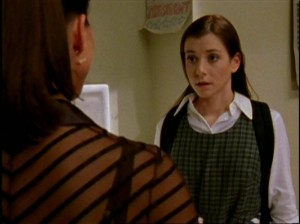
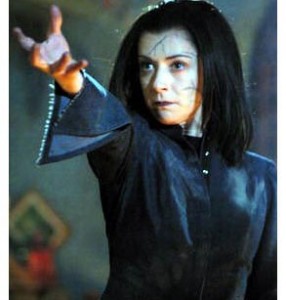
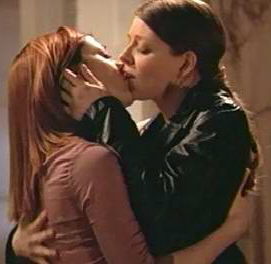
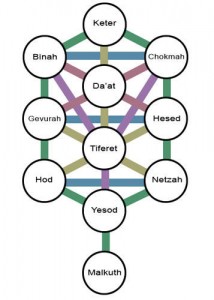
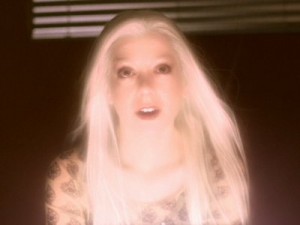
6 replies on “How Jewish is Willow Rosenberg?”
This is an extremely badly written, ill-informed article. Particularly egregious was:
“However, Willow seems to be religious enough in the beginning of the series in a way that is likely not Reform. Reform Jews, to varying degrees, are more accepting of Jewish celebrations of Christmas (as, in their view, a secular, national holiday rather than a purely-Christian one), even to the extent of putting up Christmas trees deemed to be “Hanuka bushes.” Moreover, no Reform Jew would dress as modestly as Willow did in the first episode of “Buffy.” So, after eliminating the two extremes of Jewish practice — Reform on the left and Orthodox on the right — we are left to say that Willow was, at first, a Conservative Jew.” OMG this is so wrong, I don’t even know where to start. I grew up as a Reform Jew. While we certainly weren’t REQUIRED to dress conservatively, we also weren’t required to dress provocatively! I have certainly met Reform Jewish women who would dress as Willow does in the opening season of Buffy out of their own (lack of) fashion sense, not for any religious reasons. American Conservative Jews don’t necessarily dress any more modestly than do American Reform Jews, and in no way ever in BtVS is it ever implied that Willow dresses the way she does out of any religious impetus. Furthermore, My father was a lapsed Catholic and my mother a Reform Jew. However, we NEVER had a Christmas tree in our house (my mother would have pitched a fit), and I was and remain quite militantly anti-Christmas. While it’s true that more Reform Jews will do Christmas-oriented activities than Conservative Jews, it’s not unheard of for the latter nor by any stretch of the imagination universal for the former. I most commonly see it in mixed families. So, Willow not having Christmas trees or wanting crosses around her house cannot be construed to support any particularly upbringing. What CAN be used to support theories: Willow never references having had a Bat Mitzvah; she never refers a synagogue, going to synagogue, nor being a member of a synagogue; neither she, nor her mother, are seen wearing a Star of David; when she tells her mother in season 3 that she is a practicing witch, neither she, nor her mother reference their Judaism. From this, I would gather that she, like around 50% of Americans who identify themselves as Jewish, is a Secular Jew. Which is to say, neither she nor her family practice any religion; however, because they are of Jewish background they identify as Jewish. Thus, becoming a practicing Wiccan is a change for Willow in that she is going from no religion to A religion, not because she is in any way altering an established theology. Furthermore, yes, many aspects of Kabbalah work well with aspects of Wiccan theology; not a surprise, as many of the founders of Modern Wicca were familiar with Kabbalah. However, in Jewish culture, nobody studies Kabbalah until (at the very least) they are in college: traditionally no one was allowed to do so until they were at least 40 and had children (and were male). So, citing parallels with Kabbalah and Wiccanism to support Willow not having changed religion is anachronistic at best.
It’s VERY easy to tell that a non-Jew wrote this insulting article. The author knows NOTHING of being Jewish.
I’m the author, and I’m Jewish — an American Israeli in Tel Aviv, in fact. With which specific points do you disagree?
The clear points that you seem to know nothing about Reform Judaism. Having grown up Reform, the insinuation that the way Willow dresses proves conservatism is dead wrong. And we most definitely don’t all have Hanukkah bushes in Reform homes. In all honesty, you also ignore the aspect of Judaism is that is purely cultural and ethnic, which is how some of us practice. If anything, prior to Willow becoming a Wicca, she was a cultural Jew.
And as Ara commented a year ago, Willow never references being a Bat Mitzvah, going to temple, or anything else. One thing I know from my own experiences is that a lot of Reform Jews end up not really going to temple regularly, except for the High Holidays (in that vein, L’shana Tovah). Willow doesn’t even do that, at least, not on screen.
IMHO, Willow cares enough about her heritage to mention being Jewish, but doesn’t believe in/follow the rituals. That’s a huge part of being a cultural Jew. There is pride in where you come from, but not a belief in the rituals. Nothing is ever shown to prove Willow has any real connection to the worship that would have her acknowledged by any other sect of Judaism, from Conservatism to Ultra Orthodoxy. She’s “just Jewish” – as is one of the options on the Birthright trip form.
Also, when it comes to your point about being LGBT, you forget that the directive is ONLY aimed at the priest class. Willow’s not a priest, so regardless of her being a lesbian, it wouldn’t apply to her anyways.
I agree with all your points, but Willow’s Bat Mitsvah is mentioned in the Xander Wedding episode. His father got drunk at it, too.
My guess is Hebrew is Samuel’s first language, so the language barrier may be why the article seems oddly written. Jewish culture in Israel is pretty different in a lot of ways from Jewish culture in the US, which might explain his breakdown of conservative vs. reform. The way Willow dresses in episode 1 of Buffy is super modest and conservative for almost any Israeli Jew. Putting on a pair of jeans is considered dressing up in Israel. The fashion sense is ultra-casual.